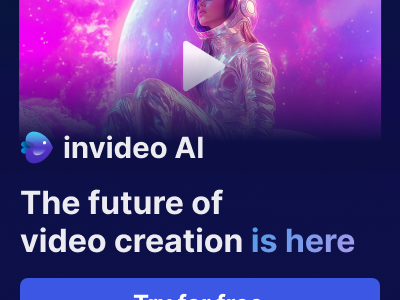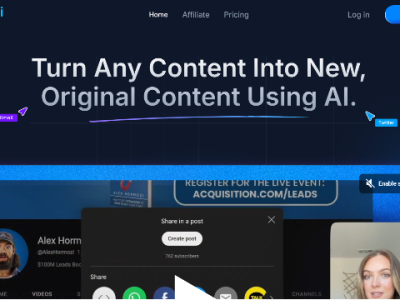Artificial Intelligence (AI) has rapidly become one of the most powerful tools transforming industries globally. AI In marketing strategy is no longer just a futuristic concept—it’s a practical solution businesses are leveraging today. From enhancing customer experience to optimizing advertising campaigns, AI helps businesses streamline operations and achieve a competitive edge.
In this digital age, where consumer behavior constantly shifts, relying solely on traditional marketing methods is no longer sufficient. Incorporating AI into marketing strategies enables businesses to respond to these changes with agility, precision, and personalization. But how exactly does AI benefit marketing? Let’s explore why every business, whether small or large, should integrate AI into their marketing strategies to drive growth and innovation.
What is AI in Marketing?

AI in marketing refers to the use of machine learning, big data, and other AI technologies to enhance marketing processes. These technologies enable marketers to gain deeper insights into consumer behavior, optimize campaigns in real time, and personalize experiences at a scale that was previously unattainable.
By automating data collection and analysis, AI helps marketers make informed decisions based on real-time insights. This improves accuracy, efficiency, and ultimately, the success of marketing efforts. Some common AI applications in marketing include predictive analytics, customer segmentation, chatbots, and recommendation engines.
The Evolution of AI in Marketing Strategy
Over the past decade, the role of AI in marketing has evolved from being a niche, experimental tool to a mainstream necessity. Initially, businesses used AI for basic tasks such as automating email marketing or creating customer profiles. However, the technology has advanced to support more complex functions such as sentiment analysis, predictive customer behavior, and AI-driven content generation.
Today, AI has moved beyond simple automation. It’s being used to analyze vast amounts of customer data and produce actionable insights that can significantly enhance marketing efforts. With machine learning algorithms improving over time, AI becomes more sophisticated in predicting trends, understanding consumer needs, and optimizing marketing strategies.
How AI Enhances Customer Insights
One of the most valuable aspects of AI in marketing strategy is its ability to gather and interpret customer data. AI tools can analyze massive amounts of data from various sources—such as website interactions, social media behavior, and purchase histories—to uncover patterns that humans may overlook. This gives businesses a 360-degree view of their customers, allowing them to create highly targeted campaigns.
For example, AI-powered predictive analytics can forecast future customer behavior based on past actions, helping marketers anticipate trends and tailor their strategies accordingly. By understanding customer preferences and anticipating needs, businesses can deliver personalized experiences that enhance customer satisfaction and loyalty.
AI-Powered Personalization: Why It’s a Game-Changer
In today’s competitive landscape, consumers expect personalized experiences. Generic marketing messages no longer resonate with customers. AI takes personalization to the next level by analyzing individual consumer preferences and behaviors in real time.
For instance, recommendation engines—like those used by Netflix and Amazon—are a perfect example of AI-driven personalization. These systems analyze user activity and suggest products or content based on past behavior. This level of personalization not only improves the customer experience but also boosts conversion rates, as consumers are more likely to engage with content or products tailored to their specific interests.
Moreover, AI can personalize email marketing campaigns, social media content, and even website experiences. By delivering the right message at the right time, AI ensures that businesses can engage customers more effectively, improving the overall ROI of their marketing efforts.
Efficiency and Automation with AI in Marketing Strategy
One of the biggest advantages of integrating AI into a marketing strategy is the ability to automate repetitive tasks. AI can handle time-consuming activities such as scheduling social media posts, sending out email campaigns, or even writing content. This not only saves valuable time for marketing teams but also ensures that these tasks are carried out with greater precision.
Chatbots, for example, are AI tools that automate customer service interactions. They can respond to customer inquiries instantly, provide personalized recommendations, and guide users through their buying journey. This frees up human employees to focus on more complex tasks while ensuring customers receive immediate support.
In addition, AI can automate A/B testing for marketing campaigns, allowing businesses to quickly determine which strategies are most effective. This results in faster decision-making and the ability to optimize campaigns in real time, ensuring maximum impact.
AI for Predictive Analytics and Data-Driven Decision Making
Data is the backbone of any successful marketing strategy, and AI makes it possible to extract valuable insights from vast datasets. Predictive analytics, one of the most powerful AI applications in marketing, enables businesses to forecast future outcomes based on historical data.
With predictive analytics, businesses can identify trends and patterns that would be difficult to spot manually. This allows marketers to anticipate customer needs, optimize pricing strategies, and make data-driven decisions that lead to better results. For example, predictive models can analyze past campaign performance to suggest the best time to launch new campaigns or adjust budgets for higher ROI.
By leveraging predictive analytics, businesses can not only improve their current marketing efforts but also plan for future opportunities with greater accuracy.
The Role of AI in Content Creation and Curation
AI has even begun to play a significant role in content creation. Tools like GPT-based models and AI-powered writing assistants can generate blog posts, social media updates, and even ad copy with minimal human intervention. This can save businesses time and resources while ensuring a steady stream of content for their marketing campaigns.
In addition, AI can curate content by analyzing what types of content resonate most with audiences. This allows marketers to focus on producing content that is more likely to engage users and drive conversions. By identifying trends in consumer behavior, AI ensures that businesses are always delivering relevant and engaging content.
AI in Advertising: Optimizing Campaigns for Maximum ROI
In the realm of digital advertising, AI has revolutionized how businesses approach ad campaigns. AI-driven tools can analyze consumer data to identify the best audience segments, optimize ad placements, and even adjust bids in real time to maximize return on investment (ROI).
For instance, Google’s AI-powered advertising platform uses machine learning to analyze which ads are performing best and automatically adjusts bidding strategies to ensure that businesses get the most out of their ad spend. Similarly, Facebook’s AI algorithms help advertisers identify the right audience for their campaigns, improving both targeting and conversion rates.
By leveraging AI in advertising, businesses can reduce wasteful spending, improve targeting, and increase the effectiveness of their campaigns.
AI in Social Media Marketing: Enhancing Engagement and Reach
Social media marketing is another area where AI is making a significant impact. AI tools can analyze social media trends, track brand mentions, and even predict which types of content will perform best on different platforms. This helps businesses fine-tune their social media strategies to improve engagement and reach.
AI-powered social media management tools also allow businesses to schedule posts, respond to customer queries, and monitor performance metrics in real-time. This ensures that marketing teams can stay on top of their social media efforts without being overwhelmed by the sheer volume of tasks involved.
By automating these processes, AI frees up time for marketers to focus on creating more strategic and impactful content, ultimately enhancing their social media presence.




Comments